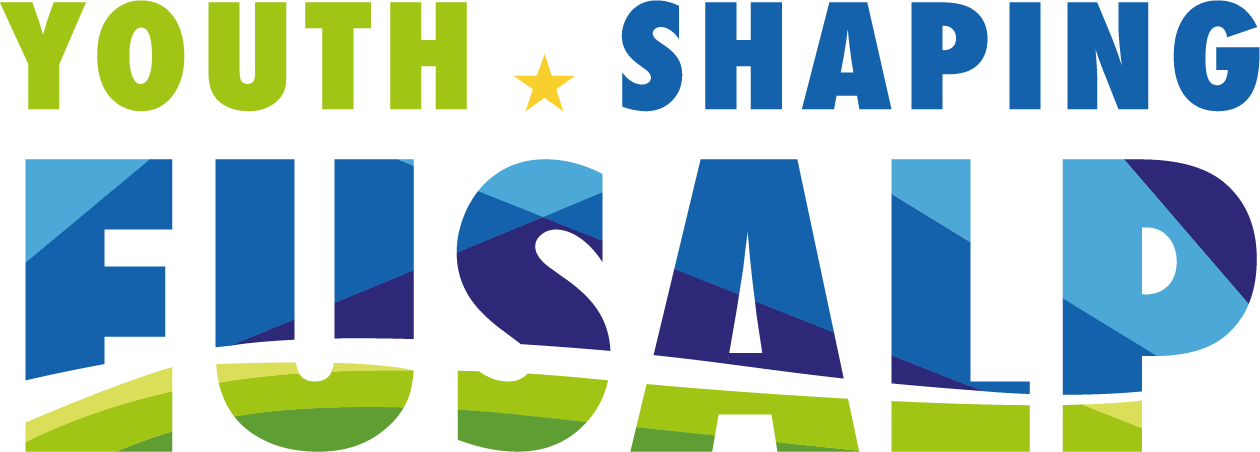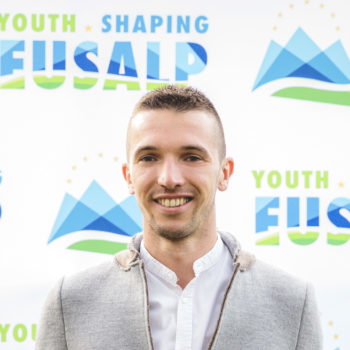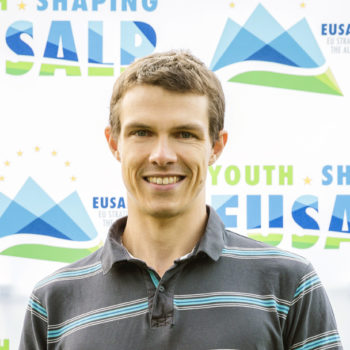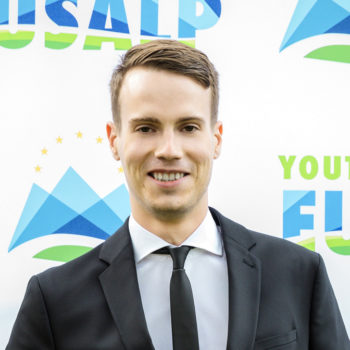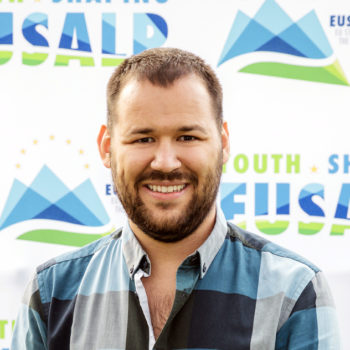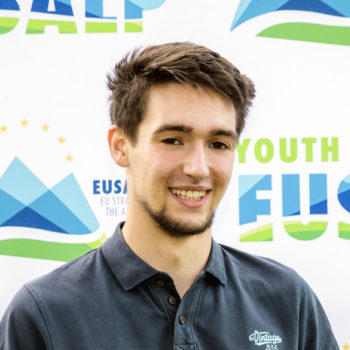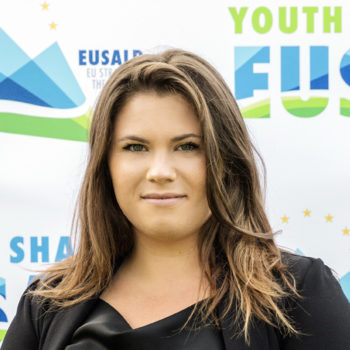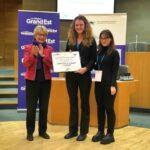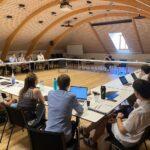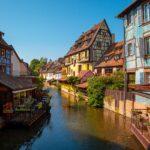Nova Gorica, 5.-7.11.2021
The EUSALP Youth Council is an official body of the European Strategy for the Alpine Region (EUSALP) that aims at building bridges to enact youth-led change in the Alpine region.
The Youth Council aims to represent the alpine youth, their ideas, and their opinions in EUSALP. Its mission is to bring the youth of the different alpine regions together and build a bridge between them and politics. The proposal of concrete political action to the EUSALP body as well as the direct implementation of projects are tasks of the Youth Council. The responsibilities of the Youth Council also include consultation with the Executive Board and the General Assembly of EUSALP as well as close cooperation with the nine action groups of the EUSALP, to ensure that the youth’s voice is heard in the decision-making process. Finally, members of the Youth Council are invited to actively work in other projects within the EUSALP Youth framework (e.g. in the jury of the Pitch Your Project competition).
This position paper defines the priorities of the Youth Council’s work. In the following, objectives, priorities and concrete projects are defined for each thematic group (TG) of the Youth Council, as well as the members of the respective TG are listed.
TG 1: Economic Development
As youth councillors in the EUSALP Youth Council we can only note that for years many mountain countries in the Alpine Region have been experiencing a huge demographic decline and an increase in the average age: more and more young families are leaving the mountain to have more city facilities.
Young people also leave the Alps and we have a duty at the level of the Youth Council to present the problem and find the possible solutions to be put in place.
We are aware that it is not a project with immediate feasibility, but if we do not start to promote a path, our future and the future of small mountain countries will be compromised. We believe that only through reduced taxation within mountain areas can a serious and concrete remedy be found and that only politics can act to achieve results and we must move in that direction.
We are aware that there may be workable solutions, such as Sezs and derivatives (Special Economic Zones) that already exist in the world, and we trust in the help of members of the AG2 to chart a path to follow.
Aims and goals
- Search for positive examples of mountain countries that are fighting depopulation and promote the actions implemented.
- Improving the cooperation of the Alpine countries in order to give a clear voice to the problem of depopulation.
- Collaboration with AG2 members to lobby on politics to expose the problem.
Projects
- create a network between small municipalities suffering depopulation;
- identify and quantify relevant depopulation data;
People
TG 2: Mobility and Connectivity
We know that transportation is one of the most important sources of greenhouse gas emissions in the European Union and in the Alpine Region. Therefore it is very important for us to be able to travel within the alpine region and limit our carbon footprint. However, we note that it is for the moment difficult to move without a car in a lot of mountain areas, and especially in the cross border regions due to the fact that the public transportation is under the responsibility of different stakeholders.
Aims and goals
- Improving cooperation between all European stakeholders of mobility with the objective of an integrated network and to avoid waste of money and to make sustainable freight and public transportation attractive and efficient.
- Discuss the attractiveness of public transportation with mobility stakeholders and encourage youth targeted offers.
- Collect data about mobility in the Eusalp region to inform policies makers and alpine citizens about this topic.
Projects
- Work on a survey to learn about the carbon footprint of the trip of the participants of the Event in Nice. Then we want to use these results to have proposals to improve the efficiency of EUSALP events.
- Work and discuss with the mobility stakeholders of the alpine region to know the main problems and explore the solution with a global vision
People
TG 3: Environment and Energy
Energy and environmental issues are amongst the most crucial matters in the Alpine region today. How we create a more sustainable Alpine region that protects its natural and cultural heritage while pushing for an energy transition towards renewable energies in the face of climate change are part of the key challenges facing us today. As the Alpine region develops and deals with new challenges, the Alpine region’s rich natural and cultural history must be maintained so that future generations can learn about their regions and appreciate their region to the full. Respectively, the youth have an important role in helping to shape the approach of the Alpine region in these areas, making it crucial that they are engaged with these topics. Thus, the role of TG3 and the EUSALP Youth Council is to further engage with the youth on environmental issues and the topic of cultural and natural heritage, in order to connect EUSALP’s institutions with the voices of the youth in this regard.
Aims
- Greater identification amongst the youth with their cultural and natural heritage
- Connecting the youth with environmental issues in the Alpine region
- Celebrating cultural diversity and heritage in our region
- Acting as a bridge between young people and experts on the themes of energy and the environment
- Cooperating with the EUSALP’s Action Groups on the thematic area of Energy and Environment
Goals
- Creation of a blog:
- TG3 seeks to launch a blog on the youth.shaping.EUSALP website. This blog will, in an interactive way, strive to inform the youth in the Alpine region about environmental issues in the Alpine Region and Alpine cultural and natural heritage.
- This will improve engagement between the youth and their heritage in the places they live and grow up in, thus strengthening their sense of identity with the natural and cultural heritage that underpins the character of the Alpine region
- In addition, it will provide a forum which offers the youth to interact and respond to and comment on blog posts regarding the issues addressed
- Creating a regular set of Energy and Environment focus topics for the youth:
- Focus topics will be chosen for our outreach activities with the youth
- The topics will be selected based on prevalent issues and matters, alongside the consideration of any relevant topics for the youth that are currently being pursued by the Action Groups
- These topics will be rotated at least once every three months
- These topics will be incorporated in the activities of TG3 i.e. online or in-person engagement events, online quizzes and social media posts, online blog
- This will lead to a better informed and educated youth
- Hold at least one youth engagement event every three months:
- Youth engagement events (online or in-person) will seek to provide a bridge between experts and the youth
- Moreover, they provide the youth a chance to learn about their region, its traditions, and its future challenges
- The events will seek to connect experts from, but not exclusively, EUSALP Action Groups with the youth, providing an opportunity for direct two-way communication between the youth and experts
Priorities
- Promotion of natural and cultural heritage to those living in the Alpine region:
- Involving the youth and public as a co-creator in their own cultural heritage
- Preserving and maintaining traditions
- Promoting sustainable practices and behaviours in harmony with the environment in the Alpine Region:
- Sustainable winter tourism
- Clean water
- Waste management in the mountains
- Sustainable food production
Projects
Current
- Blog on environmental issues, and natural and cultural heritage:
- A blog will be set up on the youth.shaping.EUSALP website covering certain topics of interest to the youth in the priority areas set up above i.e. cultural heritage, waste management in the Alps, as well as a section promoting the role of young entrepreneurs in the region who are tackling today and tomorrow’s environmental challenges with innovative and exciting ideas
- This blog will be written by members of TG3 or guests in their local languages or English (priority)
- The blog will also consist of articles on the focus topic, interviews with young entrepreneurs, vlogs, photoblogs and related interactive activities that aim to engage its readers and the youth i.e. quizzes, poem submissions, sending in their own responses to blog articles
Proposed
- Engaging schoolchildren with aquaponic systems:
- Promoting sustainable agricultural practices that can be implemented in Alpine city regions through workshops and presentations with schools
- All-on board for alternative food sources:
- Promoting insects as a viable alternative food source in the region and supporting attempts for its production in the Alpine region
- Exchange-App for cultural traditions:
- This will offer a chance for the older generation to pass on their traditions to younger generations, whether this be a skill, such as a specific handicraft, stories, or a local language/dialect
- Cultural exchange and awareness workshops:
- Interactive events held to promote cultural practices in the region i.e. cooking workshops to promote local cuisine
- Combatting mountain waste:
- Raising awareness in tourist areas about respectful and sustainable behaviour in the mountains, especially with regards to the responsible disposal of waste
